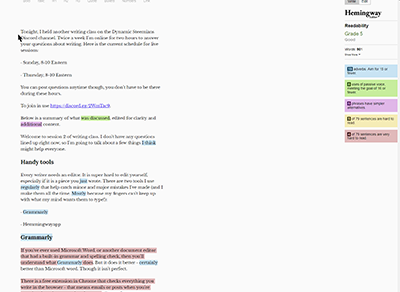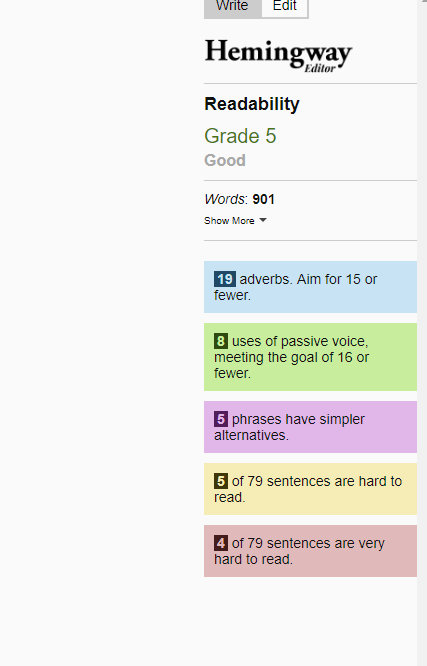
Last night, I held another writing class on the Dynamic Steemians Discord channel. Twice a week I’m online for two hours to answer your questions about writing. Here is the current schedule of live sessions:
• Sunday, 8-10 Eastern
• Thursday, 8-10 Eastern
You can post questions anytime though. You don’t have to be there during these hours.
To join in, click this link: https://discord.gg/2WmTac9.

Below is a summary of what we discussed, edited for clarity and additional content.
Welcome to session 2 of writing class. I don't have any questions lined up right now, so I'm going to talk about a few things I think might help everyone.
Handy tools
Every writer needs an editor. It is super hard to edit yourself, especially if it is a piece you just wrote. There are two tools I regularly use that help catch minor and major mistakes I've made (and I make them all the time. Mostly because my fingers can't keep up with what my mind wants them to type!):
Grammarly
- Hemmingway App
- Grammarly
If you've ever used Microsoft Word or another document editor that had a built-in grammar and spelling check, then you'll understand what Grammarly does. But it does it better - certainly better than Microsoft word. Though it isn't perfect.
There is a free extension in Chrome that checks everything you write in the browser - that means emails or posts when you're entering them into steemit or busy.org. Or any form on any website for that matter.
Here's a link to it: https://www.grammarly.com/
They also offer a premium version that edits everything you write on your computer. Well, not everything. It doesn't work in Discord, but it does in pretty much everything else I write in. It also includes a plugin for Microsoft word too.
The premium version also does things like check for repeated word usage. This feature is a lifesaver.
We all have words we repeat when writing. Usually, we don’t realize it, and often we don't need them, or there are other words we could choose that would sound better. Grammarly lets you know so you can consider changing them.
I'm pretty happy with most recommendations it makes, though it isn't perfect. For example, if you end a sentence with a preposition, it lets you know that "some readers may object" to it. Traditionally ending with prepositions (of, with, at, about, through, etc.) is frowned upon in formal writing but sometimes it's necessary. And I would bet that there are very few people who would be offended by it these days.
I also fight with Grammarly over commas. I put them wherever I want the reader to pause, even if it isn't grammatically necessary. The checker will tell me to delete it. Sometimes I do, sometimes I don't.
If there is a fix recommended that you don’t agree with you can tell it to ignore it.
Hemmingway App
The second tool is Hemmingway App.
It’s named after Ernest Hemmingway who is famous for his hatred of adverbs. Well, more accurately he believed that writers “can remove words which are unnecessary and tighten up your prose.” (source)
Adverbs are typically (there’s one!) excessive. They are the words that modify verbs (or adjectives), usually ending in -ly. Words like happily, actually, really, and so on. Many of them don’t add any specific meaning which is why they are often considered extra and should be edited out.
The tool is online at http://www.hemingwayapp.com/
The app does some other important things to help you to write clearly. Here's a sample image from the website:

You can see it uses color to highlight sentences that are hard to read, or very hard to read. And it also checks for the use of passive voice.
Avoiding passive voice
Passive voice is when you use some form of "to be." It's not bad to do that, but there are often other verbs you could use instead that make the text more engaging and lively.
Here are some examples:
Passive: The game was enjoyed by Nate.
Active: Nate enjoyed the game.
Passive: The songs were sung by the choir.
Active: The choir sang the songs.
There is a lot of grammar nerdiness regarding passive and active, but the above examples give the gist of it. Active is more direct, gives your writing more energy, and in turn engages the reader more.
Hard and very hard sentences
So how does the app know that your sentences are hard to read?
It uses a complicated algorithm that includes how many words and syllables you have in each sentence. The more words, or more syllables, or both the harder your sentence will be.
Unless you're writing something technical or academic, you should try to make sure you eliminate all the very hard to read sections. You need to use your discretion, though, as the app isn’t perfect.
Readability
The app also gives your writing a grade score. Don’t worry, it doesn’t mean you’ve been graded on your work – not exactly. What it does is measure how easy it would be for someone to read what you’ve written in its entirety. It then maps that information to a US school grade equivalent (there may be variations for other countries that I’m not aware of).

The screenshot is an evaluation of this blog so far. It scored Grade 5. That means anyone who can read at the 5th grade level of a US school should be able to understand what I’ve written so far. (You’ll see I also have 19 adverbs! Oh, my. Also that I’ve used passive voice quite a bit and have some hard to read sentences).
So you may have some sentences that are hard to read, but overall you have ones that are easy too. So your score is an average of it all.
Note: In the class, I said the readability score is based on an algorithm called Flesch-Kincaid. I tried to find my source for this, but I can’t confirm it. So I’ll say that it uses an algorithm similar to it at least, if not the actual one. Microsoft Word also can calculate readability statistics too, and it uses Flesch-Kincaid.
Copywriters, those of us who write advertising or marketing materials, usually aim for a grade level of 9.5 or lower. This means that anyone who has made it at least halfway through grade 9 (about 15-16 years old) will be able to understand what you've written. I have no idea how that maps to other educational systems, but if someone does, please let us know in the comments.
The lower the grade, the easier the text is to understand. Theoretically at least.
I've written blogs and white papers on technical cloud computing topics that came in at 11.5 but were very easy to read. But because I had to use technical computer terminology that had multiple syllables, it drove the grade level up.
Similarly, you can write something that uses very short sentences and single syllable words but is total nonsense. It will get a “Good” score from this tool.
So, like anything, use your judgment when assessing what the app tells you. It isn't a perfect indicator of readability, but it is a good guide to use.
They also have a version of the app you can buy and install locally on your computer, but I've always found the online one works just fine. The only issue is that when I edit in the Hemingway app to make my very hard sentences better, I have to remember to copy and paste it back into my main document! I've forgotten more than once.
More Resources
During the session, @DigitalMind asked me about Markdown. I came across a good post on it and shared the link:
@scrooger/markdown-editing-for-steemit-posts-easy-copy-and-paste
If you go all the way to the end of his blog, there is a template/info sheet you can download for reference.
@DigitalMind said he also had some tutorials for newbies. You should check him out to see what he posted. He also recommended Dilling.io as a cloud-based Markdown editor to use for writing that has a save function (Steemit’s doesn’t).
Conversational Writing
Next topic I covered was conversational writing.
Conversational writing is basically what it says: you write the way you would speak.
This isn't how you were taught to write in school, at least not any school I've heard of (see preposition at the end makes perfect sense!).
I'm going to use a friend I have as an example.
She's a wonderful woman who is very funny, casual, and says just about anything that comes to mind. She's fun to talk to, and adults and kids love her.
Her husband is a painter who runs his own business. I helped them put up a new website and gave her some strategies to get more business. One of those was publishing a blog on topics that people who need painters would want to read. I gave her about a dozen topics I researched to get her started.
She took a couple of weeks and then sent me a draft of her first attempt.
I didn't know what I was looking at. It didn't sound like her at all. It was very formal, choppy and unfocused - ok she can be a bit unfocused at times, but it really wasn't good. Not for a blog. It got very technical about certain kinds of paints and removing them, and it wouldn't have engaged a reader who was looking for painters.
So, I gave her some feedback about how it could be clearer, and that if she wrote more like she talked then people would connect with it more.
A few weeks later we discussed her blogging again. She said she just couldn't get herself to write differently. I recommended to her what I wrote about last class - just write and write. Not for anyone else but just for herself until she found her natural voice and could write conversationally for the blog.
But she gave up.
To get better at writing, you do need to invest some time. I don't blame her for not doing it. She's totally overcommitted already between kids, business, and volunteering. Blogging for the business just wasn't going to work for her. And that's ok.
But if you can do it, even if it means lots of practice, writing conversationally will make it easier for people to read what you write. They'll identify with it more because it feels like you are talking to THEM. That's why copywriters use it because when you're trying to sell something, you want the person reading to feel important like you are directly speaking to them.
And speaking of speaking, @DigitalMind commented that he wasn’t a good writer but was a “good talker.” And that is awesome. People who prefer to speak can use an app that translates speech to text. Then all they need to do is edit the text instead of writing it.
This discussion brought up a question about why people need to get better at writing. In this class getting better at writing means being able to communicate with other people on Steemit. If you have a lot of knowledge but your writing is too difficult to read then the message is lost. Practicing, and trying to write conversationally can help you share your knowledge more effectively.
And I didn’t mention this in class, but conversational writing is for blogs that are intended to teach or share experiences. Obviously, if you’re writing poems or fiction, then the idea of conversational writing doesn’t apply the same way.
Live Review
In this class, I was asked to review one of @DigitalMind’s recent posts. I’m just inserting the Discord conversation here (edited out non-relevant chat) so you can see what I did. If you want a live review, stop by next session by joining the Dynamic Steemians Discord: https://discord.gg/2WmTac9
DigitalMind - Today at 9:11 PM
If yo have time, pls give me some feedback on my tutorial the way I wrote.
nightowl - Today at 9:11 PM
I'd be happy to read and let you know. Do you want me to comment on it on Steemit, here or DM?
DigitalMind - Today at 9:11 PM
up to you here or DM
nightowl - Today at 9:12 PM
ok. I've got it pulled up. let me read...
ok. That was a great summary of your bootcamp. It sounds like it was informative and fun!
There were a few bullet points I would have liked more information on but I realize you were just giving us a rundown of what was covered and not teaching the course in the blog.
You said you were preparing for your own training session. Are you going to be teaching at a bootcamp @DigitalMind ?
And I'm curious, did you use a translator for any of the words? or did you write it in english?
DigitalMind - Today at 9:23 PM
Yes but I don't call it bootcamp. I just give a overview of Steemit my digital marketing group and invite them to start with me. I will hand hold them until they can write their own post.
J will also recommend them to attend the bootcamp
nightowl - Today at 9:24 PM
That's great!
The reason I asked about writing it in English mostly comes from this: "stalk tags of your interest"
Stalking has a strong negative connotation of criminal intent in English
I realize you meant it as "follow" but I've found sometime autotranslators will pick weird words for regular ones.
We continued chatting for a bit about Grammarly and how Google is helpful, but not always right.
And that’s it for today’s summary notes on Ntowl’s Writing Class 2.

Remember you can join the Dynamic Steemians Discord channel to get more writing advice and reviews, plus meet some awesome people building a supportive community for Steemit. Click the image below to join the Discord channel.

Thank you to @dynamicgreentk, @dynamicrypto, and @thundercurator for creating and nurturing such a great community and inviting me to participate.
Title image licensed from Adobe Stock
Screenshots are my own
Dynamic Steemians Gif used with permission from @dynamicgreentk
UPDATED: Adjusted the formatting of the Discord chat capture.
